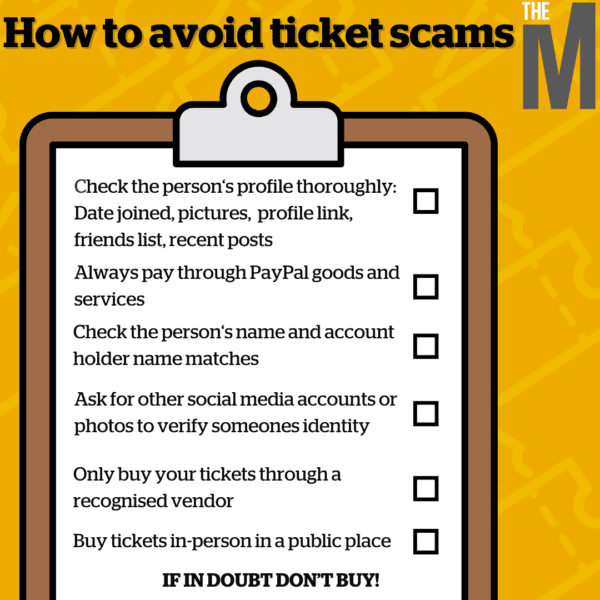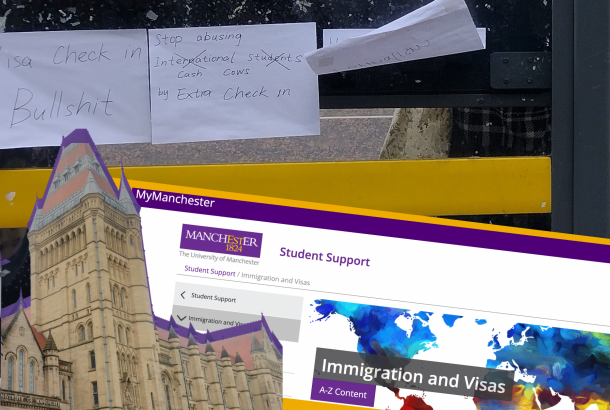Students fall victim to ticket scams on Manchester Students’ Group
By Luke Hewitt

Some of the interviewees in this article have been anonymised with fake names.
Students and graduates across Greater Manchester are falling victim to ticket scams in the popular Facebook community, Manchester Students Group. Dozens of posts in the group are from members who claim they have lost money to scammers operating bogus profiles. This story extends much further than Manchester, with scammers using unsuspecting people’s photos from across the country to create more realistic-looking profiles to dupe unsuspecting victims.
Manchester Students Group, commonly referred to as MSG, is a Facebook group and website dedicated to the student and graduate population of Manchester. At its best, MSG is a place where students can connect with one another, find new friends, share memes, and discover events happening across the city.
Ticket sales account for a large number of the posts on MSG, and this tends to increase when the Warehouse Project and festival seasons start. It’s common to see posts from people desperately seeking tickets to a sold-out event steadily increase as the weekend approaches, and then the fallout from the scammers.
We spoke to Alice, a third year Manchester Metropolitan University student, who spoke to us about her experience when trying to buy WHP tickets. “I was really desperate for a ticket as I didn’t want to miss out because all my mates were going.” Scammers exploit this desperation and force victims to make rash decisions that they wouldn’t ordinarily make. “I made sure to check her profile and everything to see if she seemed normal….I sent the money via Monzo and then she just blocked me. I was stupid to be honest, but I just trusted them.”
A graduate, Megan* told us about her experience trying to buy tickets on MSG. She and a friend were confronted with three separate suspicious accounts when looking for tickets to a Luke Combs concert.
Each encounter would start off relatively normal, “We checked her profile: it had posts from years back, and she looked about our age, so it all seemed legit.” The ‘sellers’ would always come unstuck when the issue of payment would arise. “We asked for proof of purchase and if she had PayPal. She said she didn’t…..She posted a screenshot of her proof of purchase and it said she only had two tickets”. This instantly set alarm bells ringing for Megan*. “I questioned this as she told us she had two to sell and one for herself. She told me her ticket was from AXS, and instantly, I knew it was a lie. I called her out on this, and she blocked me straight away.”
Megan had another lucky escape when a different person claiming to sell a ticket was undone by a mismatch in his bank details. “We asked for his details, he sent them, but when we put his name into our banking [app] it said ‘name does not match.’’ When she questioned why the name did not match, the seller said “it’s a joint account with my friend, please use his name.” Megan said this was an “instant red flag” and challenged him “people don’t have a joint account with their friends and then he blocked us too.”
These incidents are not only confined to residents of Greater Manchester. Siobhan* from Belfast, was in Manchester for a weekend away when she fell victim to a ticket scam. Her sister had been a student in Manchester and recommended MSG as a platform to buy tickets. She put a post on the group asking if anybody was selling tickets to a sold out event, someone claimed they had two spares, but Siobhan and her boyfriend would eventually end up losing £40.
Siobhan posted on MSG to warn others of the potential scam but instead of receiving praise, other group members were unsympathetic, “When I posted the account trying to be helpful to others in the group [MSG], everyone just laughed.” On the post in question, one commenter said “Some people just deserve it at this point” and another “You lot will never learn.”
Siobhan’s post is by no means the only one with messages of this nature; there are multiple instances of unsympathetic members from the Facebook group mocking or blaming the unfortunate people who have been caught out by the scammers.
Ticket scammers manipulate and take advantage of their victims emotions. In trying to quickly purchase tickets that are high in demand, students fall victim to these scams. This is often due to the time pressure to buy tickets at such short notice.
Victims will often blame themselves for falling victim to these scams, but it is becoming increasingly difficult to separate the fake profiles from the real. We spoke to Stephen*, from Barrow in Furness, who was forced to join the group to clear his name after a profile had used his Instagram pictures to create a more authentic-looking Facebook profile.
“I found out about the account from a friend of mine in Manchester.” By this point the account in question was being shared in the group multiple times with people claiming to have been scammed by them. “I tried messaging the account, but it blocked me and all my friends straight away.”
We spoke to a former MSG admin, who told us the steps that the admin team takes in order to protect their members. When joining the group, each Facebook profile is checked for any tell-tale signs of a scam account, “We probably take about a minute for each profile, checking things like profile age, recent activity in other groups, number of friends, and pictures.”
Any suspect accounts are refused, but the sheer volume of scam accounts mean this system is far from fool proof, and a number of accounts end up getting through and scamming people. The former admin outlined MSG’s course of action for scam victims “We check the victim’s story, remove the scammer and then report the PayPal account and Facebook profile to the cyber police department.” MSG also have a list of the names of known scammers in the ‘about’ section of the groups homepage.
Siobhan suggested she did not hear anything from MSG directly with regards to her incident, but in the comments on the post another group admin commented and said that the account had now been banned.
Other people we spoke to for this article suggested that they attempted to report potential scammers to MSG admins, and they failed to respond.
A Manchester Students’ Group spokesperson said in response: “We rely on our community to help identify potential scammers, and any members reported to any of our moderator team are immediately banned. MSG has always and will always operate a one strike and you’re out policy on scammers. Any found will be permanently blocked with no right of appeal.”
The former admin also suggested that there is an uptick in the number of scams taking place during September, “When loads of Freshers join, they get scammed easily as they don’t expect scammers in the group or aren’t aware that this thing happens.”
We asked the admin for advice on what to look out for when buying tickets on MSG. He said to “Ask for their Instagram or cross check their names on other platforms. Ask for a photo of them doing a specific pose like a thumbs up. Check their PayPal email address matches their name and always send any money through goods and services.”
They also wanted to stress the importance of reporting any scams to the group and admins as it is vital in helping prevent future scams. There is also a guide for avoiding scams as a pinned post on the Facebook group page.
A day before we were due to print this article an anonymous user posted to the group claiming to have banned 73 scam accounts over the past two weeks, signing off with “Your Friendly neighbourhood Spiderman”.

In response to this article a Manchester Students’ Group spokesperson said:
“Unfortunately, changes made to Facebook’s private policy has made an already difficult task nearly impossible. Once a scammer has joined the group, they are able to block admin and moderator profiles which restricts our ability to see their posts or comments. We are taking action to circumvent this by rotating moderators in the hopes the scammers will not be able to block all of the changing profiles.
The easiest way to stop scammers is to prevent them from joining in the first place, and we have a strict entry requirement policy (we reject more requests than we accept). Unfortunately, September and October are the months we see the most scams in the group and this is because our entry policies are difficult to enforce. For example, things we look for are length of profile existence and number of friends already in the group. Unfortunately, a fresher who may have just joined Facebook will neither have an old profile or any friends in the group. This, plus an increased level of member requests during this period (as it is the start of term) makes it difficult to judge who is who.
Since September we have recruited 4 new moderators to focus solely on this issue. We also publish a list of ‘known scammers’ in the about section of the group, which is updated regularly. Furthermore, each year we publish a detailed review of how best to avoid scammers which you can see in the top featured post of the group. To summarise it, use PayPal goods and services when buying as they offer buyer protection and refunds in the event of a scamming – and always check the age of the Facebook profile and whether the PayPal name matches the Facebook account name.
Unfortunately, using any secondary ticketing platform poses a risk to the buyer, but MSG still offers the best chance to thousands of students for securing a ticket to an otherwise sold out event – especially when buying from someone with mutual friends.
We urge anyone that has been scammed to also report it to your bank and the police.”
If you have fallen victim to a scam you can report it here at: https://www.actionfraud.police.uk/reporting-fraud-and-cyber-crime or via telephone: 0300 123 2040







